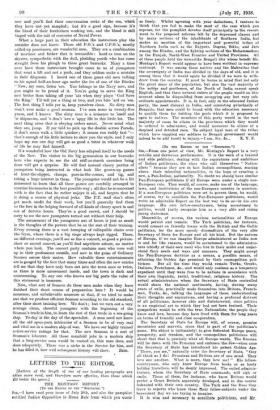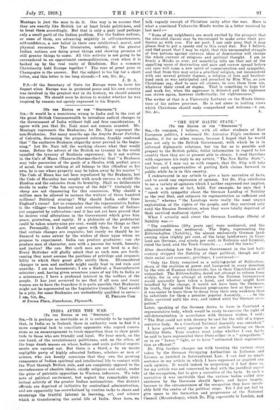[To THE EDITOR OP THZ " SPECTATOR.") SHL—From one point
of view, Mr. Montagu's Report -is a very notable and dexterous performance. It is the work of a trained and able politician, dealing with the aspirations -and ambitions of Indian -politicians, the class who call themselves "Nation- alists " because they are in fact Indian cosmopolitans, eoarjng above their inherited nationalities, in the hope of creating a new, a Pan-Indian, nationality. No doubt -we should have similar Pan-European politicians if all Europe were under a single non- European rule. They would, of course, make use of the language, laws, and institutions of the non-European country in question. If a non-European politician were set to govern them, he would, of course, try to conciliate the Pan-European politicians, would write an admirable Report on the best way to do so—in his own language. His own fellow-countrymen, being accustomed to politics, would justly recognize him as a very able and rising young statesman.
Meanwhile, of course, the various nationalities of Europe
would persist and remain. The Turk politician, for instance, would consort on friendly terms with the British and the Gallic politician, for the more speedy discomfiture of the very able Secretary of State for Europe and all his kind. But the nations of Europe, if we can imagine Europe administered as India now is and for like reasons, would be accustomed to the administra- tors (chiefly of their own race) who live in their midst and under- stand their needs and ways and manners. They might accept the Pan-European doctrine as a means, a possible means, of attaining the Golden Age promised by their cosmopolitan poli- ticians. But all the time they would remain Turks, Greeks, Italians, Frenchmen, .1sc., and would only coalesce as a temporary expedient mntil they were free to be nations in accordance with their own linguistic, racial, traditional, religious history. The aotual administrators whom the Secretary of State controlled would share the national sentiments, having, during many years of exile, practically made themselves into Britons, French- men, Turks, he., talking the languages of these, understanding their thoughts and aspirations, and having a profound .distrust of all politicians, however able and disinterested, since politics is an empirical art to which they had not been trained. Their sympathies would be with the true Nationalists, the people they know and love, because they have lived with them for long years on terms Of 'friendly and close co-operation.
The Secretary of State for Europe will, -of course,, promise
mountains and marvels, since that is part of the politician's game. His object is (ultimately) to give federated Europe peace, prosperity, and freedom, and the cosmopolitan politicians will shout that that is precisely what all Europe wants. The Russian will lie down with the Prussian and embrace the Jew—when-once the Secretary of State has introduced his patent Golden Age. " There, you see," naturally cries the Secretary of State, "they all think as I do! Prussians and Britons are of one mind. They love one another. What is more, they love me!" His fellow- countrymen, who only know Europe from books or as hasty holiday travellers, will be deeply impressed. The exiled adminis- trators, -whom the Secretary of State commands, will sigh or smile. Those of them, for instance, who know Britons would prefer a Greet Britain separately developed, and in due course federated with their own country. The Turk and the Russ they leave to experts who know these their fellow-subjects under the benevolent Raj we are trying to imagine.
It is wise and necessary to -conciliate politicians, and Mr. Montagu is just the man to do it. One way is to assume that they are exactly like British (or at least Irish) politicians, and to treat them accordingly. But that is only a part (and perhaps only a small part) of the Indian problem. For the Indian nations, or some of them, are advancing mightily in self-consciousness, self-confidence, a new belief in their own intellectual, moral, and physical resources. The literatures, notably, of the greater Indian nations are doing great things and showing promise of still greater things to come. All this activity is not going to be surrendered to an opportunist cosmopolitanism, even when it is backed up by, the real unity of Hinduism. Has a common Christianity held Europe together P The roar of greet guns in Champagne is the answer. But the subject is too big for a short letter, and this letter is too long already.—! am, Sir, &c.,
J. D. A.
P.8.—If the Secretary of State for Europe were to issue his Report when Europe was in profound peace and his own country was involved in the grea,test war in its history, we should admire his courage. We should even be driven to wonder whether he was inspired by reasons not openly expressed in his Report.



































 Previous page
Previous page